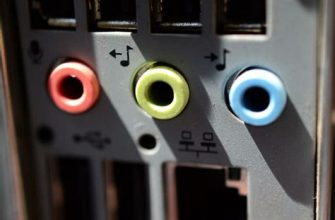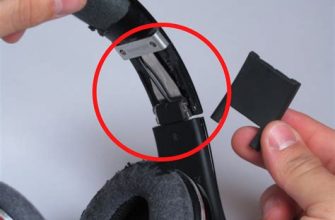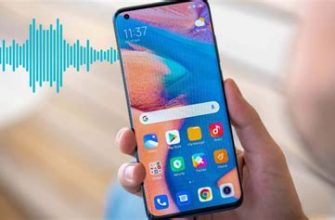
Have you ever found yourself immersed in the captivating world of music, only to be abruptly interrupted by an elusive buzzing sensation in your ears? You are not alone. Many individuals have encountered this mysterious phenomenon, with some attributing it to their daily utilization of the stylish, seemingly harmless accessory known as headphones. But can these audio devices truly be the cause of such discomfort?
Enveloping our ears in a cocoon of sound, headphones have become an integral part of our modern lifestyle. Whether it be during our daily commute or while engaging in a heart-pounding workout, these wireless wonders provide us with a portal to musical realms and immersive audio experiences. However, recent studies have discovered a potential correlation between prolonged headphone use and the onset of tinnitus, a persistent ringing or buzzing sensation in the ears.
Immersing ourselves in auditory bliss carries an inherent risk – a risk that might go unnoticed until it manifests as an unwelcome buzzing sensation. While headphones do not directly cause tinnitus, experts have surmised that excessive exposure to loud noises, such as the music channeled through our beloved ear-cupped devices, can lead to damage within the delicate structures of the inner ear. This damage, in turn, can give rise to the perceived sound of ringing or buzzing that often accompanies tinnitus.
But what exactly causes this intricate dance of disturbances within our auditory system? The answer lies in the intricate biology of the ear. The cochlea, a spiral-shaped structure within our inner ear, is responsible for converting sound waves into electrical signals that are then interpreted by our brain. When subjected to excessively loud noises, the hair cells within the cochlea can become damaged or destroyed, thereby disrupting the normal transmission of sound and leading to the perception of tinnitus.
Understanding the connection between headphones and tinnitus
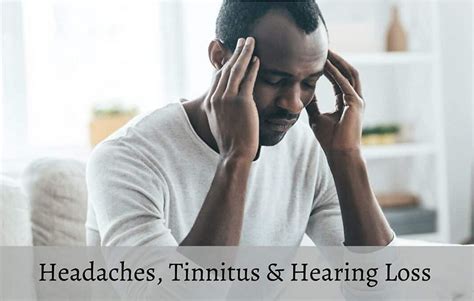
Exploring the correlation between the utilization of headphones and the development of tinnitus can provide valuable insights into the potential risks associated with this commonly used audio device. By examining the relationship between headphone usage and the occurrence of tinnitus, individuals can gain a better understanding of the factors that contribute to this bothersome condition.
- Impacts of prolonged headphone use:
- Understanding noise-induced hearing loss:
- Effects of excessive volume levels:
- Link between headphones and tinnitus:
- Preventive measures:
Excessive and prolonged use of headphones has been known to have various effects on auditory health. It is important to delve into the potential consequences of exposing our ears to continuous audio input through this device and how it might lead to adverse effects on our hearing capabilities.
Noise-induced hearing loss is a well-documented consequence of continuous exposure to loud noises. By comprehending the mechanism behind this type of hearing loss, individuals can grasp the implications it may have for headphone users and their potential susceptibility to developing symptoms of tinnitus.
One crucial factor in the development of tinnitus is the volume level at which headphones are used. Understanding how excessive volume levels contribute to the onset or exacerbation of tinnitus symptoms can assist individuals in adjusting their habits and adopting healthier listening practices.
Research studies have increasingly highlighted the connection between headphone usage and the occurrence of tinnitus. By exploring these findings, individuals can gain insights into the specific ways in which headphones may contribute to the development, intensification, or persistence of tinnitus, leading to a better grasp of the overall issue.
Considering the potential risks associated with headphone use, it becomes essential to explore preventive measures that can be taken to minimize the likelihood of developing tinnitus. Implementing strategies such as limiting volume levels, taking regular listening breaks, and utilizing noise-canceling technology can contribute to the protection of auditory health and reduce the chances of experiencing tinnitus symptoms.
How Loud Music Can Lead to Tinnitus
In relation to the topic of whether headphones can cause a persistent ringing sensation in the ears, it is important to understand the impact of excessively loud music on our auditory system. Exposing our ears to high volumes of sound, in the absence of adequate protection or moderation, can lead to a condition known as tinnitus. Tinnitus refers to the perception of sound in the absence of any external source, often manifesting as a persistent ringing, buzzing, or humming noise.
Loud music, which can be considered synonymous with high decibel levels, has the potential to damage the delicate structures within our ears responsible for transmitting sound signals to the brain. These structures, including the hair cells in the inner ear, can become overworked and eventually wear out due to prolonged exposure to excessive noise. This wear and tear can disrupt the normal functioning of these auditory components, resulting in the perception of phantom noises such as tinnitus.
It is worth noting that the risk of developing tinnitus while listening to loud music is not limited to headphones alone. Other sources of loud sounds, such as concerts, clubs, or even using speakers at high volumes, can also contribute to the development of this condition. However, the close proximity of headphones to our ears during prolonged listening sessions can further enhance the intensity of the sound and increase the risk of hearing damage.
| Factors Contributing to Tinnitus due to Loud Music |
|---|
| 1. Volume: Listening to music at excessively high volumes can directly damage the auditory system, leading to tinnitus. |
| 2. Duration: Prolonged exposure to loud music, even at moderate volumes, can gradually contribute to tinnitus development over time. |
| 3. Noise-cancelling headphones: While they provide immersive audio experiences, the noise-cancelling feature may lead to prolonged listening sessions at higher volumes, increasing the risk of tinnitus. |
| 4. Personal susceptibility: Individual susceptibility to hearing damage varies, and some people may be more prone to developing tinnitus than others. |
To prevent the potential onset of tinnitus, it is crucial to practice safe listening habits, including using headphones at moderate volumes, taking regular breaks, and using noise-cancelling headphones responsibly. It is always advisable to seek professional guidance for any persistent ringing sensation in the ears to assess the extent of any potential hearing damage and determine appropriate remedial measures.
Examining the Long-Term Effects of Prolonged Use of Listening Devices
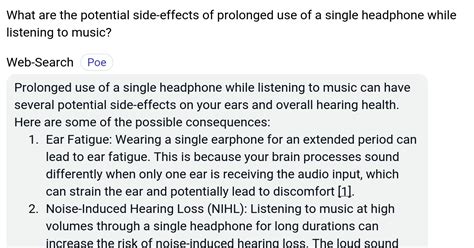
In this section, we will explore the potential consequences of extended use of listening devices, delving into the impact they may have on auditory health and overall well-being. By investigating the lasting effects of continuous headphone use, we aim to shed light on the potential risks and encourage individuals to adopt healthy listening habits.
Understanding the implications of prolonged engagement with listening devices:
Constant exposure to headphones and other listening devices can lead to a myriad of concerns that go beyond the commonly known issue of ringing in the ears. While it is crucial to acknowledge the positive benefits of these devices, it is equally important to be aware of the potential risks associated with their excessive use.
Long-term exposure to high sound volume:
Prolonged use of listening devices, especially at high volume levels, can result in permanent damage to the delicate structures within our ears. Excessive sound pressure can cause damage to the hair cells in the inner ear, leading to hearing loss and tinnitus.
Impact on auditory well-being:
Engaging in extensive headphone use can also disrupt the brain's ability to process sound accurately. This can result in decreased sound perception and a reduced ability to distinguish between various frequencies and tones.
Effects on overall health and quality of life:
The ramifications of prolonged headphone use extend beyond mere hearing-related issues. Studies have shown associations between excessive use of listening devices and headaches, ear pain, sleep disturbances, and even psychological disorders such as anxiety and depression.
As the usage of listening devices continues to rise, it becomes crucial for individuals to understand the potential consequences of prolonged exposure. By recognizing the risks tied to excessive headphone use, individuals can make informed decisions to protect their auditory health and overall well-being.
Exploring the Impact of Volume Levels on the Development of Tinnitus
Understanding the relationship between audio volume levels and the occurrence of tinnitus is a crucial factor in preventing and managing this auditory condition. By examining the influence of sound intensity on the development of tinnitus, we can gain valuable insights into potential causes and methods of prevention.
Unveiling the Connection between Loud Sounds and Tinnitus
Research suggests that high volume levels, particularly when regularly experienced over a prolonged period, can contribute to the onset of tinnitus. This condition, often characterized by the perception of ringing or buzzing sounds in the ears, can be triggered by exposure to excessive noise levels, be it from headphones, loud music, or other sources.
The Importance of Sound Intensity Moderation
It is essential to exercise caution when using audio devices, especially headphones, to avoid potential hearing damage and the subsequent development of tinnitus symptoms. By employing moderation in volume levels and incorporating regular breaks during listening sessions, individuals can significantly reduce their risk of experiencing tinnitus.
The Role of Personal Listening Habits
Personal listening habits play a crucial role in determining the potential harm caused by excessive sound intensity. Knowing one's threshold for comfortable listening and understanding the risks associated with surpassing this limit can empower individuals to make informed decisions regarding volume levels, thus reducing their susceptibility to tinnitus.
Preventive Measures and Hearing Health
Incorporating various preventive measures, such as adjusting volume settings, using noise-canceling headphones, or employing sound-limiting technology, can significantly aid in preserving hearing health. Through a combination of user vigilance and technological advancements, it is possible to enjoy audio experiences without jeopardizing one's auditory well-being.
In conclusion, recognizing the role of volume levels in the development of tinnitus is crucial for both individuals who regularly use headphones and those concerned about their overall hearing health. By implementing moderation and taking appropriate preventive measures, individuals can protect themselves from the potential risks associated with excessive sound intensity.
Do specific types of headphones have a higher probability of causing ear discomfort?
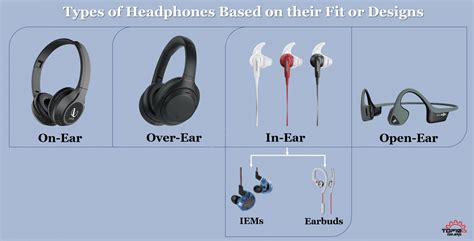
In the context of discussing the potential link between headphones and ringing in the ears, it is worth exploring whether certain types of headphones are more likely to contribute to this discomfort.
While examining the association between headphones and the sensation of ringing in the ears, it is important to consider whether different types of headphones might be more prone to inducing this condition. By exploring this aspect, we can gain insights into potential factors that may exacerbate ear discomfort.
It is possible that particular headphone designs or features could play a role in the occurrence of ringing in the ears. Some headphones may exert higher pressure on the ear canal, resulting in increased discomfort and potentially amplifying the risk of developing a ringing sensation. Alternatively, headphones that utilize specific audio frequencies or have an excessively loud volume capability could also contribute to the onset of ear-related issues.
Additionally, the duration and intensity of headphone usage may be significant factors to consider. Prolonged exposure to loud sounds, especially with types of headphones that do not adequately filter or control audio levels, could potentially lead to temporary or even permanent damage to the inner ear. This damage, in turn, may manifest as a ringing sensation or tinnitus.
Although the relationship between headphone types and the occurrence of ringing in the ears is not yet fully understood, conducting further research in this area could provide valuable insights into preventative measures and ergonomic designs to minimize the likelihood of experiencing ear discomfort or related symptoms while using headphones.
Tips and precautions for preventing tinnitus from headphone usage
When using personal listening devices, it is important to consider certain measures to avoid developing tinnitus, a condition characterized by a persistent ringing or buzzing sensation in the ears. By following these recommendations, you can protect your auditory system and minimize the risk of experiencing tinnitus as a result of headphone use.
1. Volume moderation: Ensure that you maintain a moderate volume level while using headphones to prevent excessive noise exposure. Avoid turning the volume up too high, as this can lead to damage to the delicate structures within the ear. | 2. Limit usage time: Prolonged and continuous use of headphones can increase the risk of developing tinnitus. It is advisable to take breaks during extended listening sessions to allow your ears to rest and recover. |
3. Choose noise-cancelling headphones: Select headphones that offer noise-cancelling features, as they can help reduce the need for higher volume levels. By blocking external sounds, you can listen to your audio content at a lower volume, which is safer for your ears. | 4. Use over-the-ear headphones: Consider using over-the-ear headphones instead of in-ear or on-ear models, as they provide better sound isolation and reduce the risk of sound leakage. This can allow you to enjoy your audio at lower volumes, minimizing the likelihood of tinnitus. |
5. Maintain a clean listening environment: Ensure that your headphones are clean and free from debris, as this can affect their sound output. Cleaning them regularly can help maintain their performance and prevent the need to increase the volume excessively. | 6. Take listening breaks: Avoid continuous and prolonged usage of headphones. Take periodic breaks to give your ears a chance to recover and prevent overexposure to sound. This can significantly reduce the risk of developing tinnitus. |
Remember, being mindful of volume levels, using appropriate headphone models, and incorporating breaks into your listening routine are key to preventing tinnitus. By following these tips and taking necessary precautions, you can enjoy your audio experience while safeguarding your hearing health.
Seeking medical assistance for persistent ear tingling

When individuals experience continuous sensations of buzzing or ringing within their auditory organs, it is crucial for them to seek medical guidance in order to address this persistent condition. Professional medical assistance should be pursued to offer an accurate diagnosis and determine suitable treatment options for this enduring ailment.
Avoid THESE 8 THINGS to Reduce Your Tinnitus!
Avoid THESE 8 THINGS to Reduce Your Tinnitus! by HearingTracker 288,338 views 1 year ago 13 minutes, 25 seconds

FAQ
Can wearing headphones for long periods of time cause ringing in the ears?
Yes, wearing headphones for extended periods of time can potentially lead to a condition called tinnitus, which is often characterized by ringing or buzzing sounds in the ears.
What causes the ringing in the ears when using headphones?
The ringing in the ears when using headphones can be caused by excessive noise exposure, especially if the volume is set too high. The loud sound can damage the delicate structures of the inner ear and trigger tinnitus symptoms.
Are certain types of headphones more likely to cause ringing in the ears?
Yes, over-ear headphones that have poor noise isolation or leak sound are more likely to cause ringing in the ears. This is because the user tends to increase the volume to compensate for the background noise, leading to potential hearing damage.
Can using headphones with noise-canceling technology reduce the risk of ringing in the ears?
Yes, using headphones with noise-canceling technology can help reduce the risk of ringing in the ears. By blocking out external noise, you can listen comfortably at lower volume levels, minimizing the potential damage to your ears.
Is there anything I can do to prevent ringing in the ears while using headphones?
Absolutely! To prevent ringing in the ears while using headphones, make sure to follow the 60/60 rule – keep the volume at or below 60% of the maximum level, and limit your listening time to a maximum of 60 minutes at a time. Taking regular breaks and using noise-canceling headphones are also recommended preventive measures.
Can headphones cause ringing in the ears?
Yes, prolonged and loud exposure to headphones can cause a condition known as tinnitus, which manifests as a ringing, buzzing, or hissing sound in the ears.

